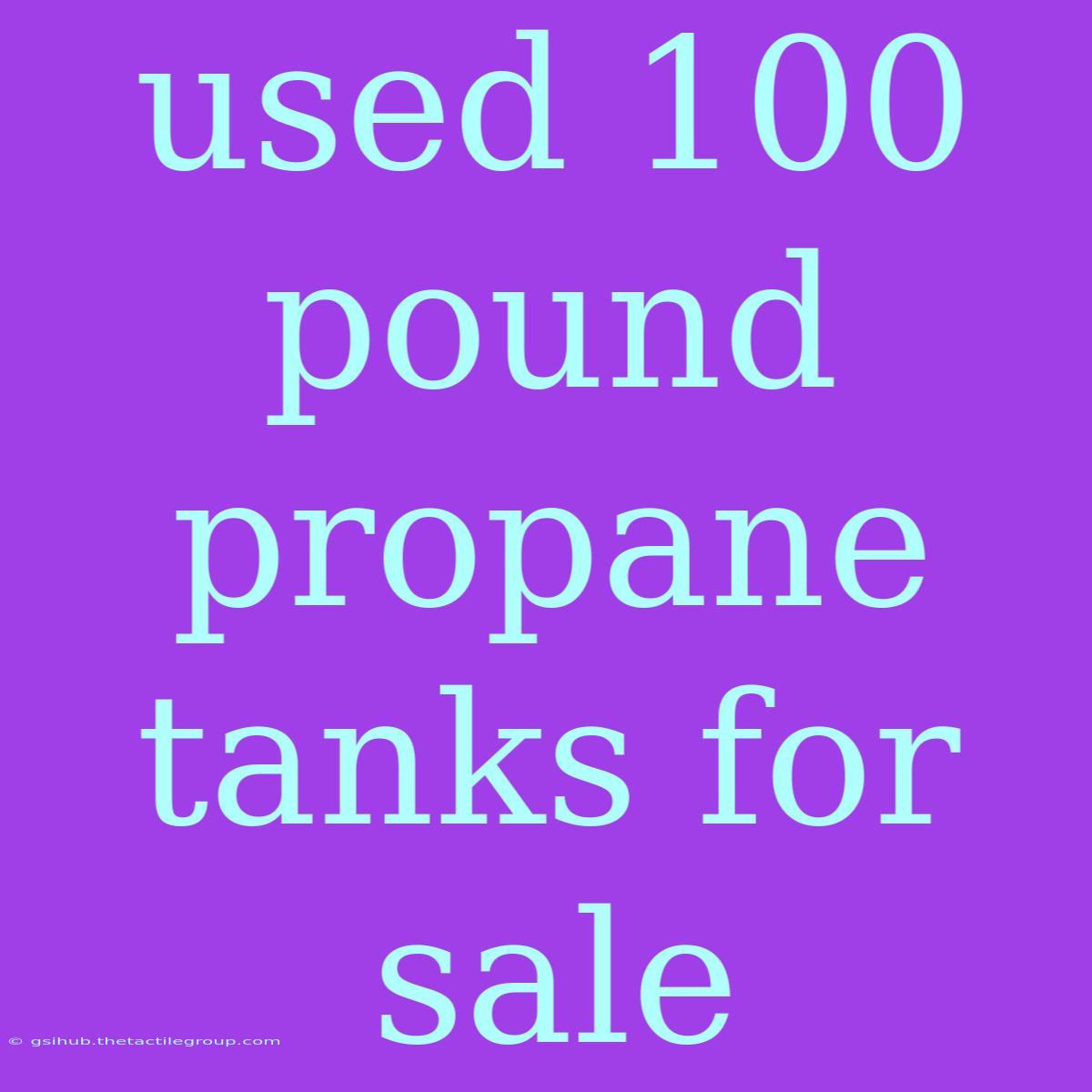Used 100-Pound Propane Tanks: A Comprehensive Guide to Finding the Right One
Is finding a reliable source for used 100-pound propane tanks a challenge? A used 100-pound propane tank offers significant cost savings, but careful consideration is crucial. Editor's Note: This guide on used 100-pound propane tanks was published today to help consumers navigate the market and ensure safe tank acquisition. Understanding the market and the necessary safety precautions is vital for both residential and commercial users.
Why is this topic important? Purchasing a used 100-pound propane tank can dramatically reduce expenses compared to buying new. However, safety and regulatory compliance must be prioritized. This guide provides the necessary knowledge to make informed decisions.
Analysis: This guide compiled information from various sources, including online marketplaces, propane supplier websites, and safety regulations. It aims to provide a clear overview of considerations when purchasing a used 100-pound propane tank.
| Key Considerations for Used 100-Pound Propane Tanks | Description |
|---|---|
| Tank Condition | Inspect for dents, rust, leaks, and damage to the valve. |
| Hydrostatic Testing | Verify the tank has undergone recent hydrostatic testing, as required by regulations. |
| Certification & Stamping | Check for proper certifications and identifying stamps indicating safety compliance. |
| Supplier Reputation | Choose reputable suppliers with positive customer reviews and established safety procedures. |
| Price vs. Condition | Balance cost savings with the overall condition and safety of the tank. |
Used 100-Pound Propane Tanks
Introduction: This section highlights the crucial aspects of procuring and maintaining used 100-pound propane tanks. Safe handling and proper maintenance are paramount to avoid accidents.
Key Aspects:
- Tank Inspection: Thorough visual inspection for damage.
- Hydrostatic Testing: Verification of recent testing.
- Certification: Checking regulatory compliance.
- Safe Handling: Proper procedures for transportation and storage.
Tank Inspection
Introduction: A detailed inspection is paramount before purchasing any used propane tank. This section examines various facets related to assessing tank condition.
Facets:
- Visual Examination: Check for dents, rust, corrosion, and punctures.
- Valve Inspection: Ensure the valve is intact and operates smoothly.
- Pressure Test (If Possible): A professional pressure test can reveal hidden leaks.
- Documentation: Review any documentation related to previous inspections or testing.
Summary: A thorough visual and, if possible, pressure testing is crucial. A damaged tank poses a significant safety risk.
Hydrostatic Testing
Introduction: This section clarifies the significance of hydrostatic testing for used propane tanks and its implications.
Further Analysis: Hydrostatic testing involves filling the tank with water under pressure to detect any weaknesses or leaks. Regular testing ensures safety.
Closing: Lack of proper testing renders the tank unsafe and illegal to use in many jurisdictions. Ensure the tank has a valid hydro test date.
Frequently Asked Questions (FAQ)
Introduction: This section addresses common questions regarding used 100-pound propane tanks.
Questions:
- Q: Where can I find used 100-pound propane tanks? A: Online marketplaces, propane suppliers, and local businesses.
- Q: How much should a used 100-pound propane tank cost? A: Pricing varies depending on condition and location.
- Q: How often should a propane tank be hydrostatically tested? A: Frequency varies by jurisdiction and tank type. Check local regulations.
- Q: What are the risks of using a damaged propane tank? A: Explosion, fire, and serious injury.
- Q: Can I refill a used propane tank myself? A: Typically, no. Refilling should be done by a licensed professional.
- Q: What should I do if I find a damaged or leaking propane tank? A: Contact a qualified propane professional immediately.
Tips for Buying Used 100-Pound Propane Tanks
Introduction: This section provides practical tips to enhance your purchasing experience.
Tips:
- Thorough Inspection: Always conduct a meticulous inspection before purchasing.
- Verification of Hydrostatic Testing: Check the date of the last hydro test.
- Reputable Supplier: Buy from a trustworthy and established supplier.
- Transportation Safety: Use appropriate transportation methods.
- Storage Safety: Store the tank in a well-ventilated area away from ignition sources.
Concluding Thoughts on Used 100-Pound Propane Tanks
Summary: This guide explored the critical aspects of procuring and using used 100-pound propane tanks. Prioritizing safety, thorough inspection, and adherence to regulations are crucial.
Final Thoughts: Utilizing used 100-pound propane tanks can be cost-effective, but only when safety procedures are strictly followed. Always prioritize safety over cost savings. Remember that the responsible use of these tanks protects both the user and the environment.

